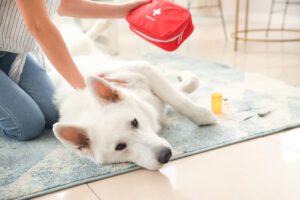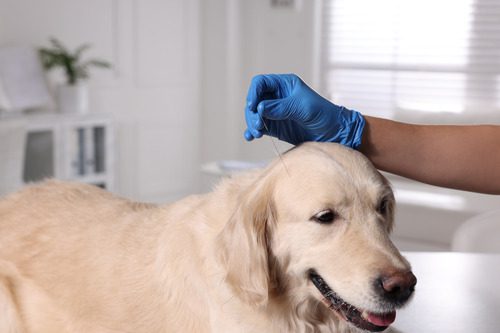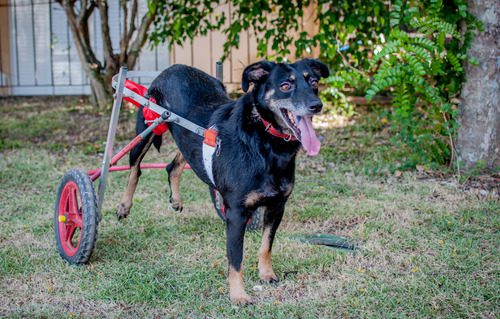Pet First Aid: Essential Supplies for Your Pet Emergency Kit
Every pet parent wants to keep their pets safe and sound, but accidents can happen when we least expect them. That’s why having a pet first aid kit ready to go can make all the difference. Whether it’s a small scrape or something more serious, being prepared helps you stay calm and give your pet the care they need. For expert advice or to make an appointment, give Cornerstone Veterinary Hospital of Clifton Park a call at (518) 383-6254.

Why You Need a Pet First Aid Kit
A pet first aid kit is like a little safety net for those unexpected moments. Maybe your dog gets a small cut while playing outside, or your cat swallows something they shouldn’t. Having the right supplies on hand means you can take action quickly, keeping your pet as comfortable as possible until you can get to the vet. Think of it as a simple way to be ready for anything life throws your pet’s way.
Must-Have Items for Your Pet First Aid Kit
Putting together a pet first aid kit is easier than you might think. Here are the key items you should include:
Basic First Aid Essentials
Start with the basics—these are the supplies you’ll need for most minor situations:
- Gauze Pads and Rolls: Perfect for wrapping up cuts or stopping bleeding.
- Adhesive Tape: Keeps those bandages snug and secure.
- Scissors: Handy for trimming bandages or even fur around a wound.
- Tweezers: Great for picking out splinters, ticks, or anything else that shouldn’t be on your pet.
- Disposable Gloves: Keep things clean while you’re helping your pet.
Pet-Specific Essentials
Your pet’s first aid kit should also include items just for them:
- Digital Thermometer: Checking your pet’s temperature is easy with a pet-specific thermometer.
- Hydrogen Peroxide (3%): Use this to induce vomiting, but only if your vet says it’s okay.
- Antiseptic Wipes or Solution: These are great for cleaning wounds—just be sure they’re safe for pets.
- Saline Eye Solution: Helps rinse out your pet’s eyes if something gets in them.
Medications and Treatments
It’s also a good idea to include some medications and treatments that could come in handy:
- Antihistamine (like Benadryl): Can help with allergic reactions—just ask your vet for the right dosage.
- Styptic Powder: Stops bleeding quickly, especially for those tricky nail trims.
- Antibiotic Ointment: A little ointment can go a long way in preventing infections in small cuts.
How to Store and Care for Your Pet First Aid Kit
Once you’ve got your pet first aid kit together, you’ll want to keep it in tip-top shape:
- Pick a Sturdy Container: A waterproof, easy-to-carry container is ideal. Make sure it’s clearly labeled so you can find it quickly.
- Keep It Accessible: Store your kit where you can grab it quickly, and if you travel with your pet, consider having a second kit in the car.
- Check Expiration Dates: Medications don’t last forever, so it’s smart to go through your kit twice a year and swap out anything that’s expired.
- Tailor It to Your Pet: If your pet has special needs, add anything they might need to your kit, like specific medications or treatments.
Tips for Handling Pet Emergencies
Having a pet first aid kit is just one part of being a prepared pet parent. Here are a few extra tips to help you handle emergencies with confidence:
- Know Your Pet’s Normal: It’s helpful to be familiar with what’s normal for your pet, such as their typical behavior, eating habits, and body temperature. This way, you can quickly spot when something isn’t quite right and take action.
- Keep Important Numbers Handy: Along with your first aid kit, have a list of emergency numbers ready—your vet, an emergency animal hospital, and a poison control hotline.
- Stay Calm: If something happens, staying calm will help your pet stay calm too. Talk to them in a soothing voice and move slowly to avoid scaring them more.
Getting Ready for Emergencies
Being prepared means peace of mind for you and better care for your pet when they need it most. Take a little time today to put together your pet first aid kit—you’ll be glad you did. If you have any questions or need more information, don’t hesitate to call Cornerstone Veterinary Hospital of Clifton Park at (518) 383-6254. We’re here to help keep your pet safe and healthy.
Recent Posts
Dog Acupuncture: Does It Really Work?
Dog Acupuncture: Does It Really Work? Dog acupuncture might sound unconventional to some, but this holistic treatment…
Dog CCL Surgery: Cost & Recovery
Dog CCL Surgery: Cost & Recovery When your dog starts limping or suddenly refuses to put weight…
Degenerative Myelopathy in Dogs
Degenerative Myelopathy in Dogs Degenerative myelopathy in dogs is a progressive spinal cord disease that often takes…
About Us
Originally opened as Animal Care Hospital by Dr. Mark Johnston in 1989, the hospital became Cornerstone Veterinary Hospital in 2015 when it was purchased by Drs. Alan and Lisa Knott. The name 'Cornerstone' holds a special place in their hearts, representing not only their Christian faith but also their commitment to being the cornerstone of the community in which they practice. As a family-owned and operated practice, every pet is treated as part of the family, ensuring they receive the highest standard of care. The team at Cornerstone Veterinary Hospital is dedicated to building lasting relationships with clients and their beloved pets, striving to be the cornerstone of the community in which they practice.



